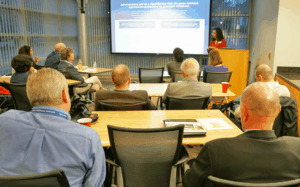
Tamara Perry, M.D., an early adopter of mobile health technology in research, was excited to see more than 35 other like-minded professionals at the first UAMS Mobile Health and Wearable Innovations Mingle in November.
“The mHealth Mingle provided investigators an opportunity to learn about exciting research at UAMS,” said Perry, who developed a mobile app to help adolescents manage their asthma. “I was surprised to see so many of my colleagues who were interested in advancing mHealth projects at UAMS and hope that events like this will lead to future collaborations.”
Held at BioVentures on the UAMS campus, the event brought together clinicians, researchers, technology companies and anyone else interested in developing or using mobile and wearable devices for health care and research. It was organized by Anita Walden, an instructor in the Department of Biomedical Informatics, College of Medicine, and Aaron Kemp, a research program manager in the Department of Psychiatry, College of Medicine. Event sponsors were the Willow Agency and Metova. The event hosts/co-sponsors were the Department of Biomedical Informatics, the Translational Research Institute and BioVentures.
For those with a BOX account, view slides here.
The first part of the event featured “rapid blitz presentations” followed by an informal session of discussion among attendees.
The gathering sparked interest between Sarah Rhoads, Ph.D., D.N.P., at the UAMS Center for Distance Health, and Christopher Harris, the digital inclusion coordinator at the Little Rock Metropolitan Housing Alliance.
“I was very interested in Mr. Harris’ presentation because I think there’s potential for research collaborations and the use of telehealth at the Housing Alliance,” Rhoads said.
Harris, a public policy doctoral student at the University of Arkansas, Fayetteville, agreed.
“The meeting was absolutely beneficial to the Metropolitan Housing Alliance,” he said. “We’re trying to help our residents address a number of chronic health conditions, and I believe there’s a lot of low-hanging fruit from a research perspective. Technology has to be part of the equation.”
Harris is one of 28 digital inclusion coordinators across the U.S. funded by AmeriCorps, the corporation for national and community service. The goal is to advance digital inclusion in low income communities.
Others at the meeting included representatives of Arkansas Innovation Hub, University of Arkansas at Little Rock, Dextera, Central Arkansas Veterans Healthcare System, BMR Management Resources, Elder Stay at Home, MKP Inspired, and the Arkansas Small Business and Technology Development Center.
“We thought that having this event would not only identify interested parties but to bring together people to form relationships and collaborations that could potentially lead to new research, applications or devices,” Walden said. “It was also a forum to learn about existing resources that can be utilized to support initiatives.”
She said such events can also generate ideas that can result in breakthroughs and identify problems that need solutions.
“Ultimately, we hope to expand the use of mHealth in Arkansas to improve health care and research methods,” she said. “We hope to have more of these types of events during the year which may have different focuses all related to mHealth.
